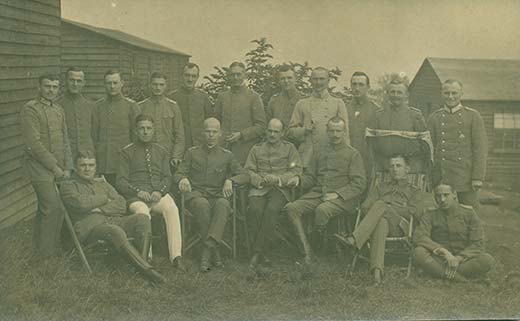Local History Society Report
Skipton's First World War POW Camp
Report of talk by Anne Buckley
Saturday, 29 February 2020
Anne Buckley's day job is as Lecturer in German and Translation Studies at the University of Leeds, but when she was handed a book written in German, which had been lying forgotten in the storeroom of Skipton Library since the 1950s, she had no idea of the world of historical research that was about to absorb her.
She explained to a meeting of Hebden Bridge Local History Society that the book was a record of the experiences of German Prisoners of War held in a camp at Raikeswood, Skipton, from January 1918 until October 1919. Some of the content of the book, published in Germany in 1920, had been written on cloth and smuggled out to families back in Germany.
It is a remarkable record of the activities of the officers held in Skipton camp, including poems, illustrations, cartoons, sketches of the landscape, details of daily life and reactions to major events: all from the unique perspective of German prisoners.

Raikeswood Camp was originally built for the military training of the Bradford Pals, and was considered ideal to house an influx of prisoners of war. There were 550 officers, and 120 men who acted as their servants. Their identities, traced through Red Cross Records, show them to be mainly reservists, from all over Germany, from a range of professions and with a range of political views, especially about war.
Because officers were not required to work they organised many activities to stem the boredom. These included theatre, choirs, orchestras, sports, education and business associations. There were keen hikers who made the most of the Craven countryside, being trusted on their honour to go out rambling, with groups of up to 150 in the care of one guard.
Others offered classes to those who may not have completed their education, managing to get external certification for German qualifications. Planning escapes was another activity, though less successful. One is recorded as ending in the Black Bull Inn in Clitheroe, where the German officers politely bought a round of beer before being handed over to the police.
Other records show that life in the camp was far from light hearted. Over a quarter had been wounded and the conditions were cold and damp. More pervasive was the mental state of men who had to fight the stigma of being captured, and perhaps perceived as traitors or deserters by those back in Germany.
They suffered particularly in the Spanish flu epidemic of February 1919, when a third of the prisoners were infected, and forty seven died. They were originally buried in Keighley, but later their graves were moved to a centralised place at Cannock Chase. A memorial stone from the time has not been traced, but in 1936 the Hindenburg airship dropped a cross and flowers to be placed on their graves.
Feelings of anxiety grew after the Armistice, as the prisoners were not sent home as they expected, but found themselves in limbo and unable to support their families. There was a poignant record of one man who begged to be shot as he was overwhelmed by a sense of his uselessness.
The mental illness which grew from these conditions was given the name 'barbed wire disease', and in order to fight depression the prisoners organised a propaganda department to campaign for their release. They constructed a hot air balloon carrying leaflets bearing slogans about their predicament and complaining about their inhuman treatment.
Anne's work on translating the book has stretched to uncover the stories of the prisoners' lives. One was a goalie for Bayern Munich; another, the captain of a U-boat, became mayor of his local town but refused to fly the Swastika when the Nazis came to power, and was found dead in 1937, possibly killed for his stance.
Another, having joined the Nazi party, then rejected its racist ideology and saved the lives of 250 Jews by insisting that they had unique skills. He was celebrated in a film, 'The Good Nazi' and rewarded with recognition as one of the 'Righteous among the Nations' by the Israeli state.
One of the leading organisers of the prisoners and editor of the book, naval commander Fritz Sachsse, had a life worthy of a Boys' Own adventure, taking in an escape across China to Afghanistan, then travelling via America and being caught and finally ending up in Skipton.
Anne was obviously delighted to have made contact with some descendants, including meeting the son of one man in Argentina, and also tracing the grandson of Sachsse, an actor based in London, who has written the foreword to her translation.
'German Prisoners of the Great War: life in a Yorkshire Camp' is published by Pen and Sword Books and will be available soon.
The next meeting of Hebden Bridge Local History Society will be 'Celebrating our woodland heritage' with archaeologist Chris Atkinson. Wednesday 11th March, 7.30 at Hebden Royd Methodist Church. All welcome.
Details of the talks programme, publications and of archive opening times are available on the Local History Society website and you can also follow the Facebook page.
With thanks to Sheila Graham for this report
See also

